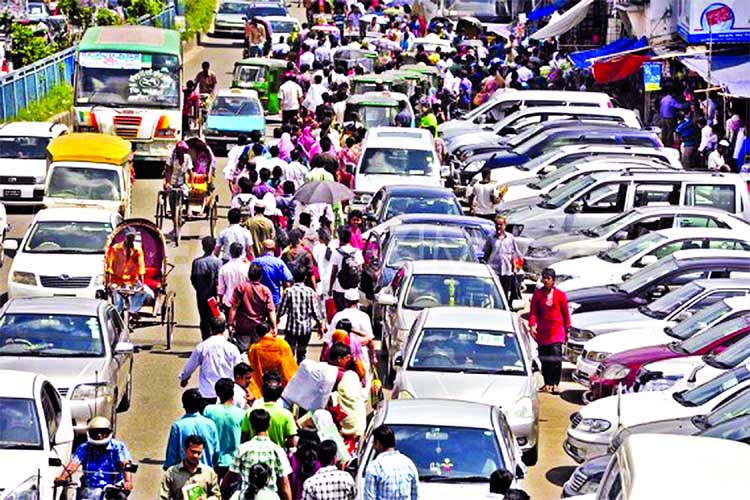
Although there is a great deal of disagreement among experts, the Dhaka Metropolitan Police [DMP] authorities on Wednesday formally introduced ‘on-street parking’ in some designated roads in the city’s busy areas in exchange of fee.
There are widespread speculations that it would further intensify traffic congestion, if authorities legalise on-street parking on specific roads in the busy commercial and residential areas.
It’s a common scenario in the city that police and drivers often are locked in argument for unauthorised on-street parking.
Without any hesitation, the traffic police fine them, though the city authorities cannot ensure adequate legitimate parking spaces. From now, parking on roads is legal, though different researches have already showed that parking eaten up more than 10 per cent of road capacities in Dhaka.
“Road parking procedure had started a few months ago. Just now, we’re officially announcing it giving the names of the streets. We’ve informed the matter officially to both city corporations,” Joint Commissioner of DMP [Traffic] Mir Rezaul Alam said. According to the officials, the city corporations [Dhaka north and south] will float tenders to engage contractors to collect fees for legal on-street parking.
Several car owners, however, have welcomed the authorities’ decision saying that it would reduce hassle when police collect bribe taking chance of illegal parking, and even sometime they use wrecker and file cases charging huge amount of fine. “It’s a good initiative. There is no legal parking in front of hospitals, schools or markets. We’ve to pay fine for parking our cars on the streets. Hope, it will reduce our hassle,” Zahir Uddin Khokan, an official of a private bank, said.
But differing with the DMP’s latest policy, Reasat E Noor, a civil engineer from Bangladesh University of Engineering and Technology [BUET] in a research paper said that on-street parking already reduced more than 10% of road capacities in Dhaka. “If on-street parking is legalised, even if only on specific roads, it will increase traffic congestion manifold,” he had cautioned. It could be mentioned here that the ‘metered on-street parking’ system is available in many western cities across the world.
Chief Town Planner of Dhaka South City Corporation (DSCC) Md Sirajul Islam recently said the city corporation and the traffic division of DMP had jointly worked to legalise on-street parking on specific roads in Dhaka.
The DSCC engineering department has worked under a project to mark parking spots on some roads in commercial and business areas, Sirajul said. “The decision of legalising on-street parking has been made to reduce haphazard street parking,” he said. According to DMP Traffic Department, under Traffic East Division 13 roads have been marked to park for on-street parking. Besides, nine designated roads under Traffic South Division, 25 roads under Traffic North Division and seven roads under Traffic West Division have been kept for parking. Of them, 120 cars could be kept on one side from in front of Investment Board office to People’s Insurance while 30 cars could be parked on the both sides from Janata Bank head office to Biman office in Motijheel.
Besides, another 60 cars could be kept from Rahmat Crossing to AGB Coloney in Motijheel while several other roads in Motijheel including in front of Ideal School would be available for parking of vehicles. Even car parking is also allowed at bust Kamalapur area. At present, tens of thousands of motorised and manual vehicles now operate on only 250 km long arteries of Dhaka’s 2,200km roads. Although the minimum road requirement is 25 per cent of the whole city, Dhaka has only 7.5 per cent road space. As a result, hundreds of vehicles do not get sufficient space to move.
The World Bank draft report -named ‘Towards Great Dhaka, a new urban development paradigm eastward’ recently said that Dhaka’s roads increased 5 per cent from 1995 to 2005 while vehicles movement increased 134 percent.
As per information provided by Bangladesh Road Transport Authority, at present there are 341,915 registered cars in Dhaka city while 27,396 cars were registered in 2016 alone.

